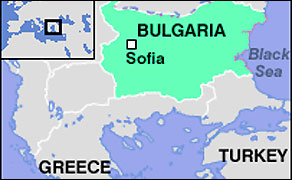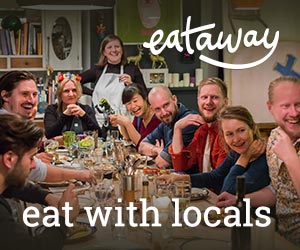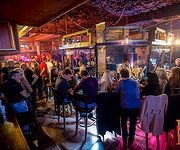Information
Situated in the heart of the Balkan Peninsula, Bulgaria boasts a long and rich history. Thracians, Greeks, Romans, Byzantines, Slavs and Bulgarians inhabited this land in their time, leaving behind monuments and enriching this treasure trove of culture. The geographical position of Bulgaria, on the crossroads between Europe and Asia, is reflected in the rich and ancient history of Bulgarian culture, architecture, cuisine, customs and traditions.
During its 1300 year history, 300 of which were spent under Byzantian rule and 500 under the Ottomans, Bulgaria has seen many dark times, but never gave up its national identity and heritage.
After World War II, during which Bulgaria declared "symbolic war" on Great Britain and the United States (but did not send its forces into combat and declined to deport its Jewish population to Nazi death camps), it acquired the reputation of being the most loyal ally of the Soviet Union, imitating Soviet collectivization and industrialization policies.
The removal from office of longtime leader Todor Zhivkov on November 10th 1989 began the current era of political and economic transition. The first round of negotiations between the Bulgarian government and the EC Commission with a view to signing the Europe Agreement of Association started in 1992 and was signed and ratified the following year. In the year 2000 the European Council adopted a decision on the official accession negotiations with Bulgaria. The country joined the European Union on the 1st of January 2007, a monumental step which is sure to bring much change to Bulgaria in the near future.
 Population: 7,707,495 (in 2001)
Area: 110,910 sq km
Capital: Sofia
Location: Europe
Bordering countries: Greece, Macedonia, Romania, Yugoslavia, Turkey
Major language: Bulgarian
Major religion: Orthodox Christianity
Life expectancy: 67,72 years (men), 74,89 years (women)
Monetary unit: 1 lev (BGN) = 100 stotinki
Main exports: electricity, gas and water; food, beverages and tobacco; machinery and equipment, base metals, chemical products, refined petroleum, nuclear fuel
Average annual income: US $1,790
Internet domain: .bg
International dialling code: +359
Population: 7,707,495 (in 2001)
Area: 110,910 sq km
Capital: Sofia
Location: Europe
Bordering countries: Greece, Macedonia, Romania, Yugoslavia, Turkey
Major language: Bulgarian
Major religion: Orthodox Christianity
Life expectancy: 67,72 years (men), 74,89 years (women)
Monetary unit: 1 lev (BGN) = 100 stotinki
Main exports: electricity, gas and water; food, beverages and tobacco; machinery and equipment, base metals, chemical products, refined petroleum, nuclear fuel
Average annual income: US $1,790
Internet domain: .bg
International dialling code: +359
About Bulgaria
Sofia has a history that goes back thousands of years. Through the centuries, many nations have inhabited it and added to its rich and diverse history. Numerous Neolithic villages have been discovered in the area, while a chalocolithic settlement has been recently discovered in the very centre of modern Sofia.
The Thracian Serdi tribe settled here in the 7th century BC and gave the first recorded name of Sofia -- Serdica. The Byzantines called it Triaditsa and the Slavs - Sredets. The modern city of Sofia was named in the 14th century after the basilica St. Sofia. (In Greek, the word "sofia" means wisdom.) In the 3rd century AD, the Romans built strong walls around Serdica, their capital of Inner Dacia and an important stopping point on the Roman road from Naisus (present Nish, Yugoslavia) to Constantinople.
Today there are many archaeological sites in Sofia, that display the city's diverse history - the castle gates and towers of Serdica, public buildings and streets thousands of years old. A large part of the ancient city of Serdica is underneath important modern buildings. The ancient city council (bulefteris) is hidden under the Sheraton hotel, while a number of basilicas are below the Hall of Justice. The Roman thermal baths are under the Sofia Mineral Baths and a Roman residence with elaborate mosaics is below the Rila hotel.
After the Hun invasion in 441 AD, the town was rebuilt by the Byzantines. The Slavs gave Sredets a key role in the First Bulgarian Empire, then in 1018 the Byzantines retook Triaditsa. At the end of the 12th century, the Bulgarians returned and Sredets became a major trading centre of the Second Bulgarian Empire. The Turks captured Sofia in 1382 and made it the centre of the Rumelian beylerbeyship. The city declined during the feudal unrest of the 19th century, but with the establishment of the Third Bulgarian Empire in 1879, Sofia once again became the capital of Bulgaria.
The city's image rapidly changed from its Oriental roots, to reflect its new European tone. Today many streets, buildings, parks, and even whole neighbourhoods preserve the architectural style from the turn of the century. Between 1879 and 1939, the population of Sofia grew from 20,000 to 300,000. Today, Sofia is home to over 1,250,000 people.
Comments
If you are in search of quality bud and other stuffs from a local dealer, just get to Isabel (rollbudup420gmailcom). SHe sells the best amongst all. SHe is highly known by many for his good job You can also find her on Telegram Id as: rollitupkush . only reliable local vendor in Town, follow the instructions and stay enjoy proper things
Replylove Bulgaria xxxxxxxxxxxxxxxxxxxxxxxxxxxxxxxxxxxxxxxxx
ReplyI am the one who is graduated from Sofia higher technical institute of forestry in 1993.And now working as higher Agroforestry technician at Federal Ministry of Agriculture.I love Bulgarians,memorizing those all my friends!
ReplyI love Bulgarian local music. One the famous local songs I remember is : Kamanite Padna Padna Ot Nebeteto*2, hapcheto padna na serseto. Iskam serense ses tebe da ghivea ses tebe da ghivea da ti pea. Kamanite Padna Padna Ot Nebeteto*2 ,hapcheto padna na serseto
ReplyMy wife and i want to go to Bulgaria in March, im british and my wife is Russian she lives with me in Wales on a spose visa she bought property in Bulgaria last year and we need to visit there what papers do we need to obtain a one year multy-entry visa
Reply
 Diligence club
Diligence club